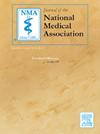新泽西州黑人居民患者满意度的主要特征
IF 2.3
4区 医学
Q1 MEDICINE, GENERAL & INTERNAL
引用次数: 0
摘要
医患关系是充分医疗保健的关键,影响健康结果和患者信任。沟通、同理心和文化能力对于塑造这些经历至关重要(Wu et al., 2021)。了解患者的偏好对于减少新泽西州的差异至关重要,该州黑人居民占人口的13.1%(美国人口普查局,2021年)。许多黑人居民更喜欢黑人医生,因为他们认为黑人医生具有文化能力和信任(Hopkins, 2002)。本研究旨在确定医生的特点,有助于满意度黑人新泽西居民,旨在加强以病人为中心的护理和减少医疗不公平。方法一项定量在线调查分析了新泽西州黑人居民对医生特质的看法。样本量采用90%的置信区间和10%的统计信度误差范围来确定。参与者是通过社区活动、组织、社交媒体和传单招募的。该调查改编自先前的研究(Grogan, 2000),测量了患者对十个医生特征的满意度:信任、尊重、个性化护理、诚实、移情、可理解的沟通、倾听、相关性、多样性和沟通。回答以5分的李克特量表从1(“非常不同意”)到5(“非常同意”)进行评分。结果样本量由n = 65名参与者组成,他们都是新泽西州的黑人居民。在测量的十个医生特质类别中,评分最高的是可理解(x′ = 4.41)、个性化护理(x′ = 4.32)和诚实(x′ = 4.28)。相比之下,评分最低的类别是尊重(x´ = 3.48)和沟通(x´ = 3.43)。评分最高的个人陈述是“当我的医生花时间彻底解决我所有的问题和担忧时,我最感激他们”(x ā = 4.69)。评分最低的个人陈述是“我认为,如果我属于不同的种族或族裔群体,有时我会得到更好的医疗服务”(x ā = 3.28)。其余性状评价如下:同理心(x̄ = 4.19)、听(x̄ = 4.23),信任(x̄ = 3.92),关联性(x̄ = 3.80),和多样性(x̄ = 3.98)。结论本研究结果为了解新泽西州黑人居民对医生特征的偏好提供了有价值的见解。可理解性、个性化护理和诚实的高评分表明这些特征对患者满意度至关重要。在评分最高的个人陈述中,对个性化护理的强调尤为明显,“当我的医生花时间彻底解决我所有的问题和担忧时,我最感激他们”(x ā = 4.69),强调了以病人为中心的护理的重要性。评分最低的陈述(x ā = 3.28)反映了如果属于不同的种族或族裔群体,可能会得到更好的照顾的看法。这凸显了医疗系统中存在的偏见和种族主义问题。由于慢性病在黑人社区的高患病率,未来的努力应集中在需要以病人为中心的护理和量身定制的干预措施。这些方法可以防止延迟诊断并延长黑人人口的寿命。本文章由计算机程序翻译,如有差异,请以英文原文为准。
Key Traits for Patient Satisfaction among Black New Jersey Residents
Introduction
The patient-physician relationship is key to adequate healthcare, influencing health outcomes and patient trust. Communication, empathy, and cultural competency are crucial in shaping these experiences (Wu et al., 2021). Understanding patient preferences is vital to reducing disparities in New Jersey, where Black residents comprise 13.1% of the population (U.S. Census Bureau, 2021). Many Black residents prefer Black physicians due to perceived cultural competency and trust (Hopkins, 2002). This study seeks to identify physician characteristics that contribute to satisfaction among Black New Jersey residents, aiming to enhance patient-centered care and reduce healthcare inequities.
Method
A quantitative online survey analyzed Black residents’ perceptions of physician traits in New Jersey. The sample size was determined using a 90% confidence interval and a 10% margin of error for statistical reliability. Participants were recruited through community events, organizations, social media, and flyers. The survey, adapted from prior research (Grogan, 2000), measured patient satisfaction across ten physician traits: Trust, Respect, Individualized Care, Honesty, Empathy, Understandable Communication, listening, Relatability, Diversity, and Communication. Responses were rated on a 5-point Likert scale from 1 ("strongly disagree") to 5 ("strongly agree")
Results
The sample size consisted of n = 65 participants, all identified as Black residents of New Jersey. Among the ten physician trait categories measured, the highest-rated were Understandable (x̄ = 4.41), Individualized Care (x̄ = 4.32), and Honesty (x̄ = 4.28). In contrast, the lowest-rated categories were Respect (x̄ = 3.48) and Communication (x̄ = 3.43). The highest-rated individual statement was “I appreciate my doctor most when they take the time to address all of my questions and concerns thoroughly” (x̄ = 4.69). The lowest-rated individual statement was “I think there have been times when I would have gotten better medical care if I belonged to a different race or ethnic group” (x̄ = 3.28). The remaining traits were rated as follows: Empathy (x̄ = 4.19), Listening (x̄ = 4.23), Trust (x̄ = 3.92), Relatability (x̄ = 3.80), and Diversity (x̄ = 3.98).
Conclusion
The results of this study provide valuable insights into Black residents' preferences regarding physician characteristics in New Jersey. High ratings for Understandable, Individualized Care, and Honesty indicate that these traits are crucial to patient satisfaction. The emphasis on individualized care is especially evident in the highest-rated individual statement, “I appreciate my doctor most when they take the time to thoroughly address all of my questions and concerns” (x̄ = 4.69), highlighting the importance of patient-centered care. The lowest-rated statement (x̄ = 3.28) reflects the perception of potentially receiving better care if belonging to a different racial or ethnic group. This highlights ongoing concerns of bias and racism within the healthcare system. Due to the high prevalence of chronic diseases in Black communities, future efforts should focus on the need for patient-centered care and tailored interventions. These approaches can prevent delayed diagnoses and increase the lifespan of Black populations.
求助全文
通过发布文献求助,成功后即可免费获取论文全文。
去求助
来源期刊
CiteScore
4.80
自引率
3.00%
发文量
139
审稿时长
98 days
期刊介绍:
Journal of the National Medical Association, the official journal of the National Medical Association, is a peer-reviewed publication whose purpose is to address medical care disparities of persons of African descent.
The Journal of the National Medical Association is focused on specialized clinical research activities related to the health problems of African Americans and other minority groups. Special emphasis is placed on the application of medical science to improve the healthcare of underserved populations both in the United States and abroad. The Journal has the following objectives: (1) to expand the base of original peer-reviewed literature and the quality of that research on the topic of minority health; (2) to provide greater dissemination of this research; (3) to offer appropriate and timely recognition of the significant contributions of physicians who serve these populations; and (4) to promote engagement by member and non-member physicians in the overall goals and objectives of the National Medical Association.

 求助内容:
求助内容: 应助结果提醒方式:
应助结果提醒方式:


